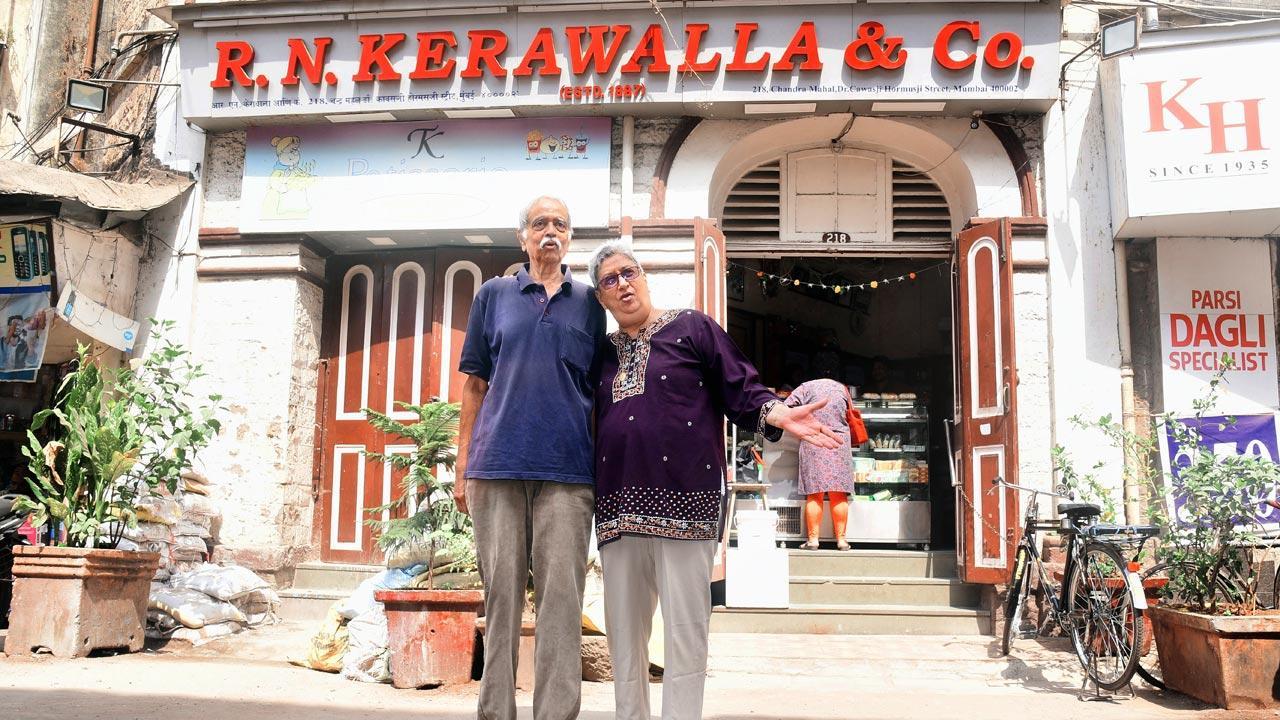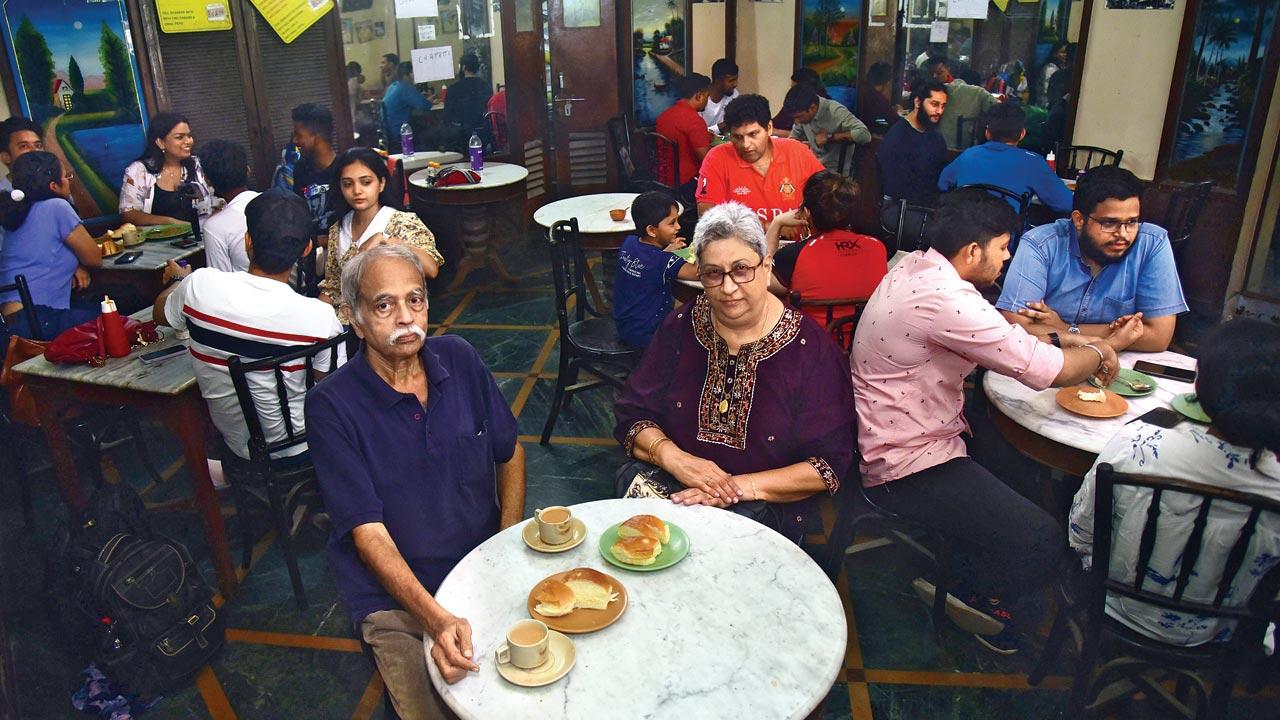Urban historian Deepak Rao and Tanaz Kerawalla of RN Kerawalla & Company, talk business, Bombay and the business of Bombay

Deepak Rao and Tanaz Kerawalla outside Kerawalla & Company and at Sassanian Restaurant, Marine Lines. Pics/Shadab Khan
 Tanaz Kerawalla, 61, provision store proprietor
Tanaz Kerawalla, 61, provision store proprietor
ADVERTISEMENT
Deepak Rao, 72, police historian and city buff
Walking through a favourite part of your city is an altogether heightened experience in the company of its locals. No matter if one of them shifted to suburban Malad in recent years. Urban historian Deepak Rao still happily strolls this home turf (it is practically so, with him having lived round the corner from Dhobi Talao for 67 years), revisiting it often. And each time he does, a regular stop is RN Kerawalla & Company.
The 135-year-old store on Dr Cawasji Hormusji Street, run by Tanaz Kerawalla, draws contented loyalists to a quaint array of all items typically Zoroastrian. From topis and torans to sadras (muslin vests indicating initiation to the faith with the Navjote ceremony) and sapaats (close-toed slippers), to pickles and pastries, the iconic shop stocks them all.

How did the author of the seminal 2006 book, Mumbai Police, and a grand dame shopkeeper of Sonapur—one of this predominantly Catholic neighbourhood’s three wonderful but vanishing villages, slightly south of Dabul and Cavel—become good friends?
Quite organically, as it happens. Tramping through the trio of Trinity Street, 2nd Marine Street and Wellington Street, cutting through the Dickensian labyrinth of needle-narrow gullies of Dhus Wadi, we wander deep within the heart of Sonapur bazaar. Halting to chat over hot brun maska and chai at Sassanian, right under a vintage frame famously advertising the 1913-established boulangerie with the line: “Before trying elsewhere please give us a trial.”
Deepak Rao: It was thanks to my young son that I started visiting the Kerawalla shop. Back in the late 1970s, Rohan loved their chicken and to this day we trust only Kerawalla’s quality of poultry products. My wife Bhanu loves their khari and jeera biscuits.
Tanaz and I hit it off well. I liked that she was a talkative lady. There was fun, there was mischief. I felt good and looked forward to coming to meet people at such a welcoming place.
Tanaz Kerawalla: Arre, Deepak will out-talk me hollow. He is aware of so much that has gone on. Name a person or event, he has a great story connected to it. He probably knows more about our shop than I do. When it was introduced by my husband Keki’s great-great-grandfather, Rustamji Nusserwanji Kerawalla, it was on the opposite side of this road. In the early years they made excellent shoes for polio patients and industrial safety boots.
I started sitting at the counter regularly after 1999 when Keki died of kidney and heart complications. Everyone who has ever bought any of our stuff knows me well in the locality. But only one person calls me “Momo Aunty” and he’s related to Deepak.
DR: Ha ha, correct. As I left home in Malad this morning, my badmaash baccha of a grandson asked where I was going. I told him and he promptly asked, “Are you meeting Momo Aunty?”
TK: It’s funny when you think our association has been strengthened by these two little boys, first Deepak’s son Rohan and then Rohan’s son Rudra.
DR: But what a demographic difference between the span of those years. When I brought Rohan here, from round the corner where we lived on Queens Road, mainly Parsis and Christians lived in the Dhobi Talao-Marine Lines area. After the late 1990s, there has been a cosmopolitan mix with an influx of Maharashtrians and Muslims. The main communities currently could be the Jains and Marwaris.
TK: Everything must change. Even I had to, as a person. People can be difficult to deal with, whether staff or customers. As a simple girl from Jer Baug in Byculla, who studied commerce and married in 1984, I needed to adjust to the rough bakery business. At one time I could not bring myself to say a milder word like “Saalaa”. Today, I’m a PhD in the subject (of swearing). In politer company I’ll call someone a capital C! In different ways, each of us is aware that we’ve got to be tough to survive this city.
DR: I follow whatever she utters, not just gaalis, let’s make that clear. My mother taught me Gujarati and I used to read your Jam-e-Jamshed newspaper. The English section mainly, with those exciting Phantom and Mandrake comics.
TK: Deepak toh atyaarech ardho Bawo chheh—he is half a Parsi already. Always so very interested in us. He acknowledges the contributions Parsis continue making to society and knows the history of every member of the community in Bombay. Whenever I pass on issues of the Parsi Times and Parsi Junction to him, he’s really thrilled. Above all, of course, he is a mad hatter Bombay lover. “Bambai ka deewana” is what he calls himself.
DR: This shop is truly an antique gift to our city. After originally opening across its present spot in 1887, on Lohar Street as it was once named, Kerawalla’s relocated in around 1915 at this building, Chandra Mahal, which was erected in 1908—I confirmed from a plaque on its other side.
TK: Quality control is something we prioritise at our base in Yazdani Bakery on Khadilkar Road in Girgaon. Now, both my sons, Kerfegar and Kayomars, make yet another generation taking Kerawalla & Company onwards. The involvement of a fifth generation is a matter of pride.
DR: I try coming every couple of weeks, for Tanaz’s company and the first-class products served in a hygienic way. Theirs is a fully glove-worn operation. She is the moving spirit behind this shop and imparts a personal touch to it. Clients from Andheri and as far as Thane place orders with Kerawalla’s. They also parcel anywhere in the world.
TK: I hear accounts of their lives from customers coming from all over. Having gone with Deepak for a walk to Mahim Fort with members of the Bombay Local History Society, I realise that on retiring, I want to discover more about my city and travel the world too.
Author-publisher Meher Marfatia writes monthly on city friendships. You can reach her at meher.marfatia@mid-day.com/www.meher marfatia.com
 Subscribe today by clicking the link and stay updated with the latest news!" Click here!
Subscribe today by clicking the link and stay updated with the latest news!" Click here!







